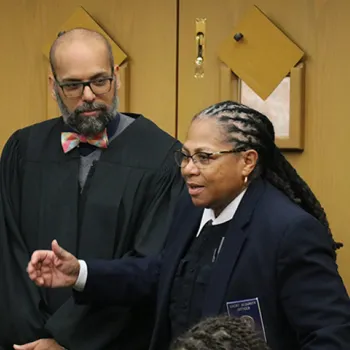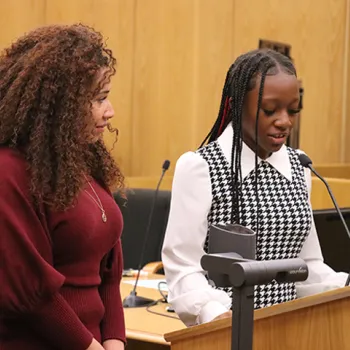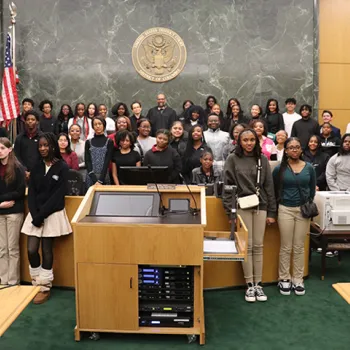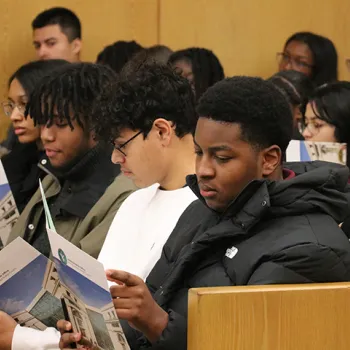High school students across the country are envisioning themselves as court professionals, judges, jurors, and lawyers as they participate in a national civics initiative this month, in commemoration of Bill of Rights Day, Dec. 15.

Students are judges, jurors, and attorneys in a court simulation on the impact of the Bill of Rights on their lives.
“Young people have made historical changes in our country, often through the courts. The first step of that journey is being aware of your rights,” said U.S. Magistrate Judge Zia M. Faruqui, who hosted 53 students from Frederick Douglass High School in his D.C. courtroom.
The program Bill of Rights in Your Life is an interactive experience that exposes students to constitutional issues. Whether in a classroom or a courtroom, the activity features a robust question-and-answer period facilitated by a judge, an attorney volunteer, and a non-attorney court professional, including probation and pretrial personnel who also talk about career paths in the courts.
“The best part was hearing everyone’s different, heartwarming stories,” said high school student Cheyenne Nkem.
As part of the career exposure element of the event, Clerk of Court Angela D. Caesar spoke to students about her journey from entry level position to serving as the first Black female Clerk of Court in the nation. She encouraged the students to go to college, set themselves up to advance in their jobs beyond their expectations, and to consider careers in the courts.
“This is an opportunity to introduce students to the many careers in the courts, all of which play a fundamental role in the administration of justice,” Faruqui said.
Several courtroom deputies, U.S. marshals, and court security officers also talked about their career paths, including one whose first exposure to the courts was participating in a courtroom program when he was in high school.
“I learned that you can always change how you see your future,” said Souran Moore, a high school student who attended the program. “The judge and the other professionals gave us very important encouragement.”
Student feedback documented that interacting with judges and court staff breaks through negative stereotypes and helps students see the difference between reality and media portrayals.
“It was different because Judge Judy is not like this,” said high school student Isaiah Ali. “The judge I met today was way better.”
Twenty-five schools across the nation already are participating in the Bill of Rights program in December and beyond. The court teams are planning visits virtually and in-person to help students gain a real-world understanding of the Bill of Rights and the types of careers available in the justice system.
“We found that when we circulated the program information through the North Dakota Department of Public Instruction, many teachers expressed interest,” said U.S. Magistrate Judge Alice R. Senechal, of the District of North Dakota. “They immediately saw the potential to open up students’ horizons to careers in the courts and learn how the Bill of Rights impacts their lives.”
Teachers interested in classroom or courtroom visits may send their requests to Rebecca Fanning, the national educational outreach manager at the Administrative Office of the U.S. Courts and she will help coordinate a visit virtually or in-person. Visits may be scheduled starting in December and until the end of the school year.
Visit the educational resources section for additional programs and activities.
Subscribe to News Updates
Subscribe to be notified when the news section is updated.




